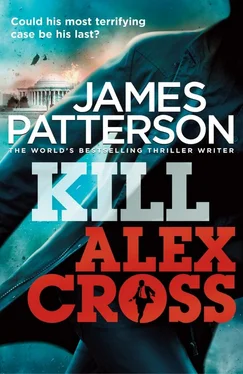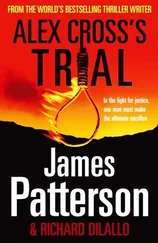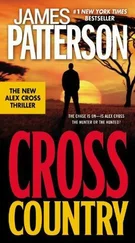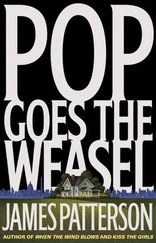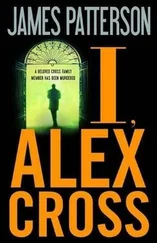Tariq tilted the envelope to empty its contents — a disk in a thin jewel case, two American passports, a car key, and an engraved hotel folio with a room entry card inside.
“There’s a list of our targets there,” Uncle said, indicating the disk. “We will assemble a team for you. Whatever you like, whatever you need.”
Hala took it all in, searching her mind for an appropriate response. “Thank you, Uncle,” she said finally. “We’re honored.”
“Don’t be.” For the first time, there was a scowl on the man’s face. “This is about The Family, not some American version of self-glorification.”
Hala felt embarrassed. “Of course. I understand,” she said.
Then the man’s face turned again. He grinned that grin of his, and winked as he took another bite of breakfast.
“But I do think you’ll like the Four Seasons,” he said. “It is a very good hotel.”
The kidnapper understood everything there was to understand about the case, and definitely more than the Washington police, the plodding Secret Service, and the painstakingly ineffective FBI. He watched them as they continued to search for any hint of a clue or evidence misplaced on the campus of the Branaff School. They weren’t going to find anything, though. He was certain of that.
Record .
“I have been thinking, obsessing over these desperate measures for over two years, and actually planning it for fourteen months. I believe that I’ve covered my tracks, and the more I go over the details, the more confident I am that this will go down as one of the great unsolved cases in history.”
A school bell rang just then — lunch!
He slid the tape recorder into a trouser pocket and decided to stroll out onto the school campus, to parade among the still-nervous students and teachers, but also the cops who were there performing their tireless yet pointless interviews. Talk to me, just me , he couldn’t help thinking.
As he strolled along, he noticed a tall MPD detective, a striking figure, an obviously confident man. He knew this one, had read about his becoming part of the investigation. This detective had a success record that was some cause for concern.
The kidnapper didn’t turn the tape recorder back on now, though his finger played over its shape. Still, he was recording inside his head.
Record .
“One of the MPD detectives on the case solved a major kidnapping years ago. If I am as thorough as I believe I am, I have to admit that he’s a danger to everything I’ve done, to all that I have accomplished, to the entire plan and its rewards. I feel this everywhere in my body. He’s different from the others, just as I am different from my fellow man and woman. I think I know what I should do now, but can I do it? Can I kill Alex Cross? It’s the right thing to do.”
Just off the Northwest corner of Sixth and P streets, a plain white van sat stationed at the curb. The aluminum ladder and PVC pipe on the roof rack masked an air vent, which in turn masked a six-millimeter lens taking live footage of the mosque across the street.
FBI Agent Cheryl Kravetz was on periscope. She shifted the joystick control in her right hand, bringing the double front doors of Masjid Al-Qasim into focus, just as the early morning service began to let out.
The sidewalk filled up quickly. There were more men than women by far, in everything from thobes and skullcaps to Abercrombie T-shirts and patent leather high-tops. But there were families, too, and a good number of couples. Kravetz was particularly interested in the couples.
“Is it just me,” she asked, “or does this whole thing seem kind of—”
“Open-ended?”
Her partner, Howard Green, kept his eyes on the console in front of him, where a bank of five small screens and two large ones showed various surveillance images. One of the big screens had a shot of the intersection, patched in from a Department of Transportation camera on the stoplight just outside the van. The other showed what Kravetz was seeing.
“I was going to say ‘racist,’” she went on.
“Here we go again.”
“I mean, seriously. We have no idea what we’re looking for here. ‘Suspicious Muslims?’” Kravetz took her hand off the controls to air-quote the last part. “I don’t even know which of these people are Saudi, or if that even matters.”
“Nobody said ‘suspicious Muslims,’” Green countered.
“They didn’t have to,” Kravetz said. “We all know what they want us to do. Scan the brown faces for a while, see what we see. Make sure everyone feels like we’re on the job.”
“We are on the job,” Green said. “How do you think this works? You prefer to sit around and wait for more Americans to die? ’Cause you can bet your ass these bad guys aren’t going to sit on their heels.”
“All right. Cool your jets. I’m just saying—”
“Yeah, I got it the first couple times.”
“— ACLU’s going to have their hands full before this thing is over. That’s all.”
Agent Green reached down and took the last bacon, egg, and cheese biscuit from the greasy McDonald’s bag at his feet. He knew he was better off not going there with Kravetz, especially this early in the day. The Bureau was spread thin, and their relief wouldn’t be coming for another ten hours. Maybe more.
Then, as Green looked up again, something caught his attention. It was a well-dressed couple, coming out of the mosque at the back of the crowd. Nothing strange there — except they were both loaded down with luggage.
“What’s with the suitcases?” he said. Kravetz took her eye off the periscope to see what Green meant. He put a finger up to the screen. “That couple, right there.”
The woman had stopped to lower her hijab . The man, clean shaven with a Ravens cap on his head, took up the larger bag she’d just set down and handed her a briefcase to carry instead.
“Maybe they came in on a red-eye,” Kravetz offered. “Went straight to services from the airport.”
“Maybe,” Green said. “Stay with them.”
He watched as Kravetz put the couple in the center of her frame. She pressed a thumb control on the joystick and zoomed in close enough to snap a still image of their faces just before they continued up the sidewalk.
“Nice work,” Green said.
Kravetz was still watching the young Middle Eastern couple walk away.
“Nice ass,” Green went on. “She’s kind of smoking hot, isn’t she?”
“I’m sending this in,” Kravetz said dryly. But yes, the woman was definitely hot.
With a few keystrokes, the image was on its way to IDENT. Both faces would be electronically logged and then scanned against an international database of known terrorists and persons of interest. Secret Service’s facial recognition system would pick it up, too.
“See, this is exactly what I’m talking about,” Kravetz said. “Do you know how many random, innocent people are pouring into the system right now?”
“There must be some kind of compelling intel on that mosque,” Green said. “They’ve got us on this corner for a reason.”
“Yeah, us and a hundred other JTTF teams on a hundred other corners. This is a needle in a haystack. On a good day.”
Agent Green took a bite of his sandwich and tried not to think about it. They had a long shift ahead, and they were already talking in circles. Even if Kravetz was right — and she probably was — there was no sense in admitting it now. He’d never hear the end of it.
After our early morning meeting at CIA headquarters, Ned Mahoney and I were both detailed straight over to the FBI’s Counterterrorism Division, also in Langley. It’s housed in a secure building called Liberty Crossing, or LX1 for short.
Читать дальше
